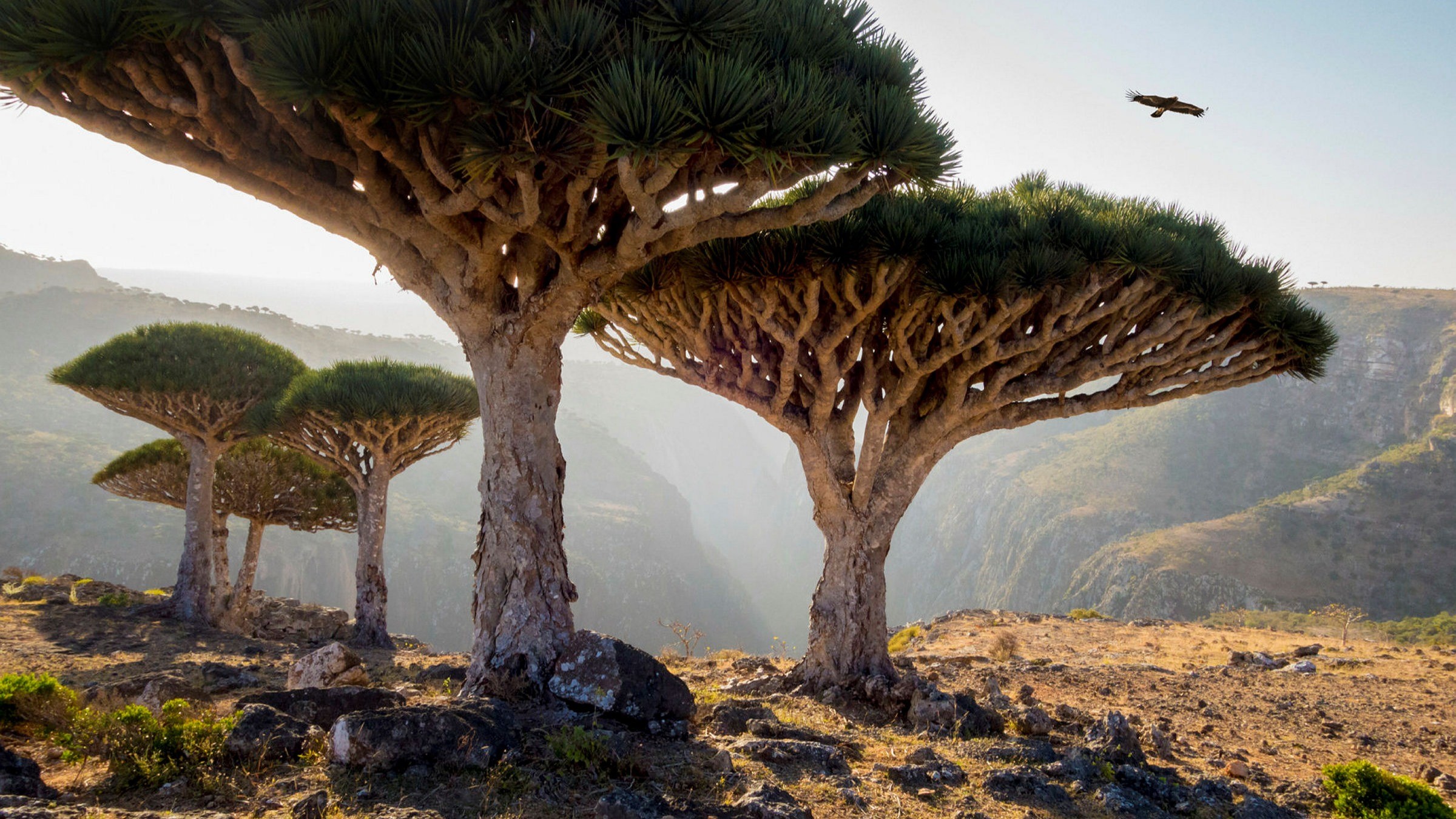
Our planet has fewer and fewer surprises in store, and with globalisation, the extermination of many animal and plant races, the different climatic zones tend to resemble each other more and more. There remain a few paradise islands, not yet destroyed by mining or mass tourism, where unique animals and plants continue to thrive despite humanity’s increasingly lethal intrusions. Socotra is one such paradise: 150 square kilometres of non-volcanic land, located at the entrance to the Gulf of Aden (a strategic, militarily and commercially privileged position), which is considered by ethologists and ethnologists to be the part of the planet that best represents our imagination of an alien planet[1].
For thousands of years, the inhabitants of the island have lived off the fertility of the land, sheep farming and, in more modern times, the export of their date and tobacco production[2]. The people who live there are unfortunately hostage to the geopolitical, military and commercial interests of the major powers in the area: the United Arab Emirates, Turkey and Israel. This is why it is important to talk about it, even if, unlike Yemen, to which Socotra belongs according to international agreements, here the terrible war unleashed by the Houthis, Saudis and jihadists has not arrived. Because the military and espionage installations built illegally on the island, and tolerated by the international community, could soon wipe out this small piece of natural wonder.
History of an ancient people
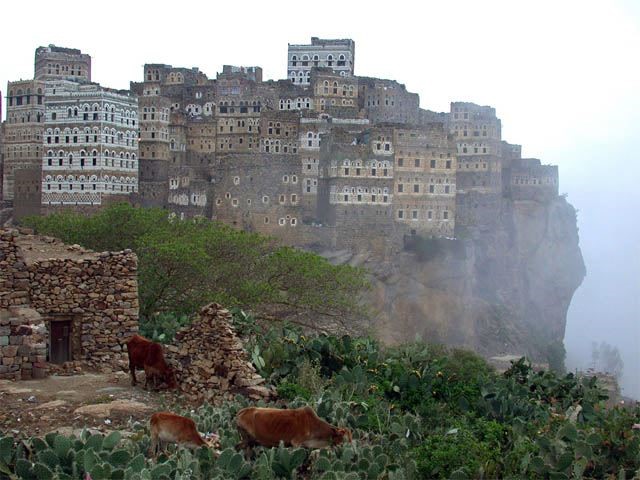
The capital Hadiboh, built on top of a hill over 2000 years ago and still intact today[3]
Yemenis and, more generally, southern Arabs consider themselves descendants of a common biblical ancestor, Qahtan[4]. From an identity point of view, this heritage is of fundamental importance as it relegates Yemenis born of different ancestors (the Khaddam and Akhddam) to the lowest rungs of the social ladder – the same fate as families of Indian, Somali or Ethiopian descent[5]. The inhabitants of Socotra, an island located in the Indian Ocean about 350 kilometres from the Yemeni coast, are considered ‘foreigners’ because they belong to a different cultural heritage, which took shape from a Greek settlement established by Alexander the Great in the 4th century BC[6].
For naturalists, the island, together with the archipelago of the same name, is a sought-after destination: many of the plants and animals that populate it are found nowhere else in the world[7]. This oasis of biodiversity was listed as a UNESCO World Heritage Site in 2008[8]. The inhabitants of Socotra speak an unwritten pre-Islamic language (Socotriyya) and their cultural traditions are both eco-sustainable and difficult to defend, since they rely exclusively on oral perpetuation[9], and risk being endangered by the consequences of the conflict that has been bloodying Yemen since 2014.
The island’s population, which was around 90,000 at the end of the 20th century, has grown to 150,000 due to the arrival of refugees from the mainland, most of whom live in Hadiboh, the capital[10]. In addition to those fleeing, technicians and military personnel are constantly arriving on the island from Saudi Arabia and the Emirates, which began building military bases in 2016[11].
Yemen, an endless tragedy

10 October 2021: Aden Governor Ahmed Lamlas’s car is ambushed, five civilians die[12]
As in many contemporary conflicts, Yemen’s crisis is the result of the collapse of the State, made inevitable by economic weakness, corruption and inefficient bureaucratic structures, unable to win the trust of a people used to living according to laws different from those of the West[13]. Yemen was only born in 1990, when the South (People’s Democratic Republic of Yemen) and the North (Yemen Arab Republic) agreed to create the Republic of Yemen[14].
The newborn state has been plagued by continuous conflicts: those between north and south, which led to the civil war of 1994, and those between the government in Sana’a and the Houthi tribes of Sa’dah, in the mountainous north-west, which have been in continuous turmoil since 2004[15]. The common thread running through this troubled period is Ali Abdullah Saleh, president of the Republic from its formation until the end of 2011, when he was forced to resign following the wave of protests of the Arab Spring[16].
Saleh, president of North Yemen since 1978, has ruled for thirty-three years[17]. His medieval-style dictatorship and his inability to deal with economic, social and ethnic issues have created a situation in which the entire geographical area has crumbled under the weight of the claims of various military forces: first and foremost the ROYG (Republic of Yemen Government), the internationally recognised government, which is in power when the clashes begin and has been led since 2012 by Abdu Rabbu Mansour Hadi[18], in exile in Saudi Arabia since the capture of Sana’a in December 2014[19].
The government took office in Aden in January 2015, only to repair to the city of Ataq following the seizure of Aden by the Southern Transitional Council (STC) in 2019[20]. The ROYG is supported militarily by a Saudi-led coalition[21]. The Houthi Forces are acting against the ROYG: is a Zaydite Shia-led movement formed under the leadership of members of the Houthi family, which controls much of western Yemen, including the capital[22], and is supported economically and militarily by Iran[23]; The third player is Al-Qaeda, active in Yemen since 2009, which operates mainly in the southern territories where, with mixed fortunes, it is in power in some coastal areas[24]; the fourth key contender is the STC (Southern Transitional Council) – a southern separatist force supported by the Arab Emirates since 2017 and led by Yemeni general Aidarous al Zubaidi, former governor of Aden[25].
The war between these three main factions has produced the worst humanitarian crisis on the planet: since 2015, some 3.6 million people have had to leave their homes, 400,000 of them in 2019, living in inhuman conditions in a country with very little health infrastructure, made even more inadequate by Covid-19[26]. The situation is further aggravated by the obstruction of humanitarian assistance by the Houthis, which has forced the international community to reduce aid[27]. At least 18,400 civilians have lost their lives in the six years of war[28].
Hurricane Abu Dhabi
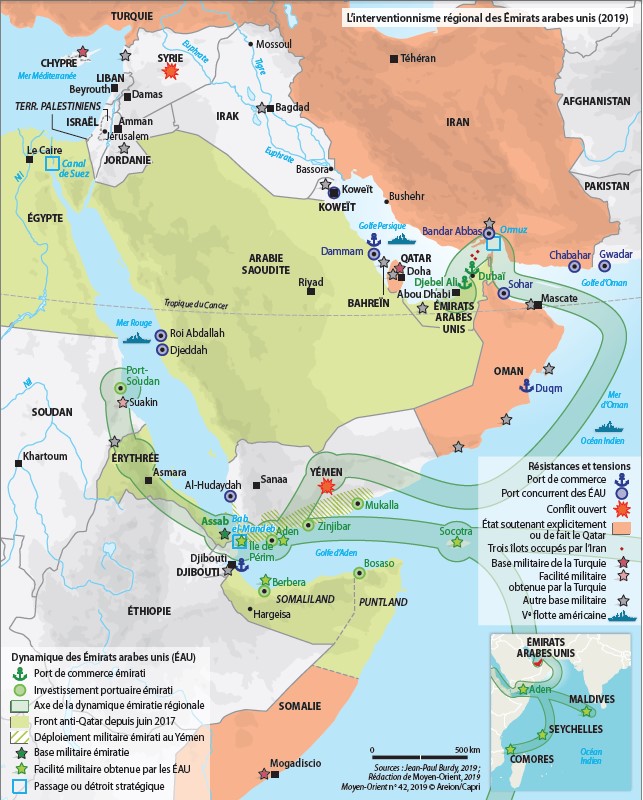
Map of international military bases controlled by the United Arab Emirates[29]
Socotra is not involved in military operations, but for the island the beginning of the war coincides with natural disasters: in November 2015 the archipelago was hit by cyclones Chapala and Megh, which killed 26 people and injured 78 others, leaving behind a trail of destroyed buildings[30]. The Khalifa bin Zayed Al Nahyan Foundation, led by Sheikh Mansour bin Zayed Al Nahyan (Deputy Prime Minister of the United Arab Emirates), promptly sent humanitarian aid: food, blankets, tents, medical equipment and materials, as well as 1200 barrels of fuel[31].
Ten months after the beginning of the Yemeni conflict, the Arab Emirates entered Socotra, spending 110 million dollars on humanitarian aid, the reconstruction of schools, roads, public buildings[32] and a hospital[33]; the Socotra International University was also opened and the local airport upgraded[34]. Important investments were also made in the creation of modern telecommunications infrastructures, in collaboration with Emirati companies[35]. Fish processing factories are being built to support the local economy, and major investments are being made in tourism[36].
It is a project that is anything but charitable: on 15 May 2017, the Emirati administration completed a military base on the island, capable of housing 5,000 soldiers, creating a new front of tension in an already very unstable area[37]: the maritime border between Somalia, ravaged by decades of civil war[38], and Yemen itself. At least piracy, which had been using Socotra as a supply base for several years, was defeated[39]. It is therefore a full-scale military occupation, made official by a contract granting the archipelago to the Emirates for 99 years, signed by Yemeni President Hadi in 2014[40], which contrasts with the infrastructure investments made by Iran (for the same purpose) in the previous decade, and with the plans of Saudi Arabia, which in March 2008 sent emissaries to Hadiboh in search of investments[41].
The arrival of the Emirati military in Socotra provoked a hostile reaction among the local population, who accused Abu Dhabi of carrying out excavation and construction activities without the permission of the Yemeni government[42]; in defiance of the inestimable natural value of the territory, Dubai companies were looking for precious metals underground[43]. When Hadi, realising he had been swindled, protested, it was too late[44]; the operations were coordinated by the Emirati Foreign Minister Anwar Gargash[45], a great friend and ally of President Trump[46], and diplomatically close to the separatist movement STC[47].
In May 2018, the mediation of the Saudi government leads to an agreement: the Emirati military leave Socotra, replaced by their Saudi counterparts, who take over the task of training Yemeni special forces, leaving them to guard the local port and airport, and undertake to ensure the supply of drinking water and electricity to the inhabitants[48]. Saudi Arabia (the main ally of the Emirates[49]) takes control of the island, while Emirati militias go to fight on the mainland, in the fight against the Houthis and al-Qaeda[50].
Socotra and al-Mahra: parallel destinies
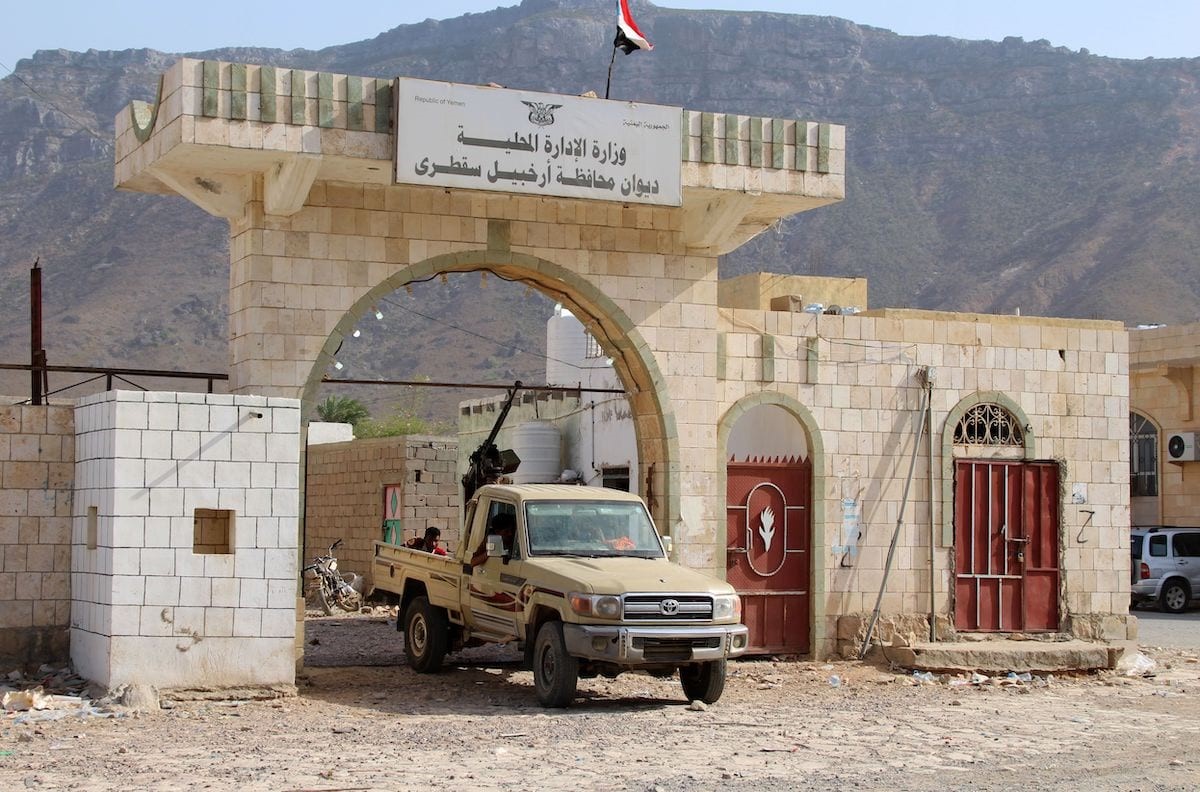
A military base built in 2020 by the Emirati government on the coast of Socotra despite the agreement that had handed over military control of the archipelago to the Saudi army[51]
In September 2019 Issa Salem bin Yaqut, Sheikh of Socotra, spoke to Congress in Washington about the situation in Yemen, with particular reference to the territories under his control (al-Mahra and Socotra), not hiding his concern about the behaviour of the Emirates and Saudi Arabia[52]: on the 29th of August, the Emirati air force bombed the Yemeni regular army, engaged in fighting for the control of the port of Aden against troops of the STC[53]; at the same time, the Saudi governorate supports the work of pro STC proselytism operated by the Emirates[54]. Bin Yaqut also refers to Al-Mahra, once part of a single caliphate with Socotra: a southeastern region of Yemen, since 2017 it has been invaded by Saudi Arabia, which installs military bases in civilian facilities such as ports or airports, carrying out arbitrary kidnappings and deportations, planning the exploitation of gas and oil as well as the construction of pipelines to transport oil from Saudi wells to the Arabian Sea[55].
The only opposition to the inclusion of al-Mahra in Saudi Arabia comes from Oman, an ally of Qatar and Turkey, which is attempting to impose its presence in the area through campaigns to support the local population and protect those opposed to the Saudi occupation[56]. The campaign began in 2015, when the Emirates established military bases in this region for the military training of 2000 units chosen from the locals[57]. Both the military bases and the surrounding villages are tied to water and electricity supplies from Oman[58]. Governor Bin Kuddah, with the open support of the Muscat government, claims exclusive control of the troops trained by the Emirates – but they choose to abandon al-Mahra – and, in 2017, the year of formation of the Southern Transitional Council, he is invited by the head of the STC, Aiderous al-Zubaidi, to join the secessionist struggle, receiving a refusal in response[59].
On 5 November 2019, the Memorandum of Understanding of the Riyadh Accords is signed: the negotiations see representatives of President Hadi’s Yemeni government and representatives of the STC sitting opposite each other[60]. The parties affirm the common commitment against the Houthi supported by Iran, with the objective of “liberating” the territory of the State[61]. The agreements, strongly desired by Saudi Arabia to limit the proliferation of open fronts in the conflict, include the recognition of the STC as an interlocutor in the UN peace talks (an important sign of legitimacy for the separatists) and the commitment to form a new government that includes members of the STC[62]. In exchange, Hadi obtained the certification of the disengagement of the Arab Emirates from the conflict and the end of Emirati support to the separatists[63].
A few months later, in April 2020, about three hundred STC militiamen landed in Socotra, and with them the first skirmishes with the Yemeni army, while the Saudi military remained inactive[64]. A truce is signed, which is the prelude to an unexpected development of events: on the 19th June, the Saudi forces hand over their military bases to the STC forces[65], and the STC announces that it has taken possession of all the governmental and military structures of Socotra[66]. The governor of the island, Ramzi Mahrus, and all his officials are forced to leave the island to take refuge in Oman; Mahrus declares that he has decided to surrender to avoid bloodshed[67].
Raft Al-Taqlee, the STC representative on the island, claims that the decision to take control of Socotra is a result of the growing influence of the al-Islah party on Hadiboh’s government. Al-Islah, a member of the coalition that forms the Yemeni government, is said to be an offshoot of the Muslim Brotherhood, which has taken control of the island with the aim of discrediting the work of the STC[68].
The Turkish countermove
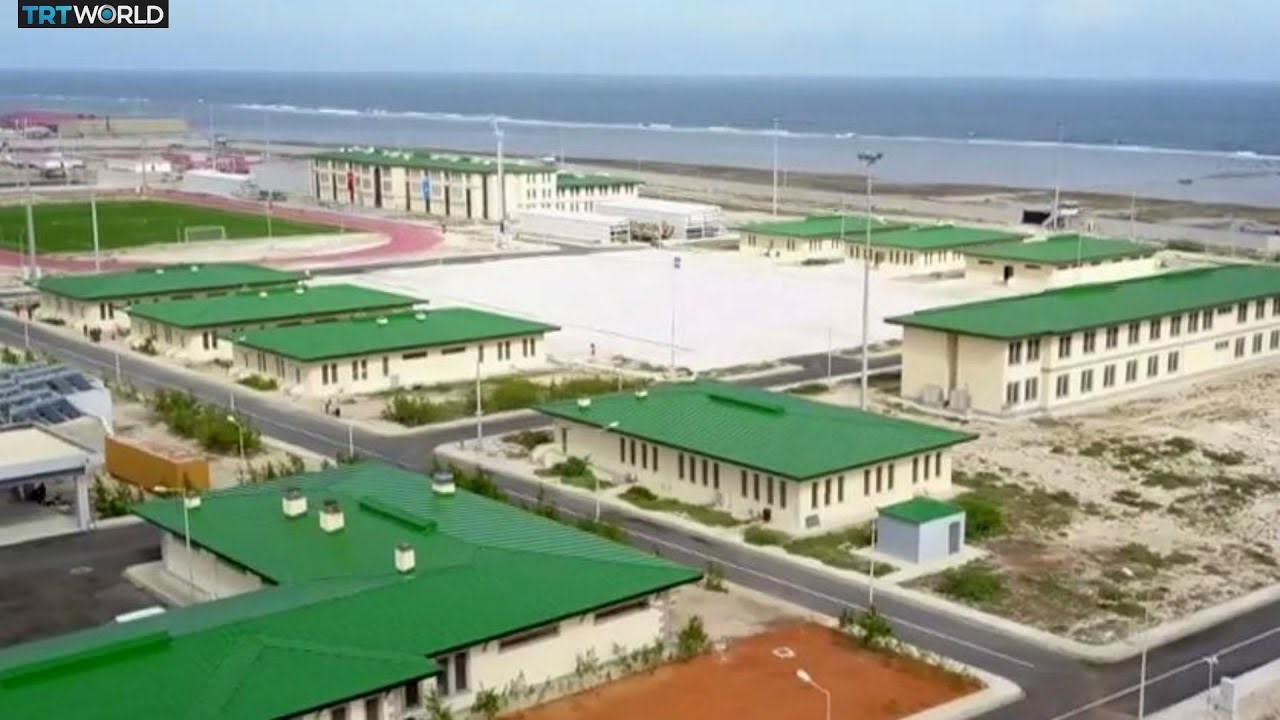
Turkish military base on Somalia’s beaches, opposite Mogadishu, inaugurated in 2017[69]
Since the crisis with Saudi Arabia in 2017, Qatar has been using the events in Socotra as a springboard for media attacks against Riyadh and Abu Dhabi’s operations in the Gulf of Aden area, finding in Turkey and Erdogan a natural ally, since the latter, intent on bringing Somalia under Turkish influence[70], considers the Socotra archipelago a strategic point, close to Turkish military bases in Somalia[71]. The taking of Socotra by the STC would have the double effect of putting a temporary end to Turkish-Qatari expansionist projects on the island, and to highlight the existence of agreements between the Ankara-Doha axis and the Houthi, according to which the Muslim Brotherhood would help the rebels to take possession of the north of Yemen in exchange for support for Turkish-Qatari control of the south[72].
A confirmation of the Turkish commitment comes from the growing activity of the Turkish Relief Organization in the Yemeni governorates controlled by the Muslim Brotherhood and from the wide involvement in the coordination of these activities of Hamid al-Ahmar[73], Yemeni businessman in exile, a prominent member of the Muslim Brotherhood[74]. The year 2021 changes the cards on the table, at least in appearance: at the beginning of January, during a summit of the Gulf Cooperation Council (GCC) held in the Saudi city of Al-Ula, the six nations that make up the council (Saudi Arabia, Bahrain, United Arab Emirates, Qatar, Oman and Kuwait) sign a solidarity agreement, putting an end to the economic-political embargo on Qatar since 2017[75]; Air flights between Doha and the countries of the former anti-Qatar coalition (Saudi Arabia, United Arab Emirates, Bahrain and Egypt) resume, and the Saudi-Qatari border is reopened[76].
The reasons for the dispute and its possible conclusion share the same motive: the Saudis reproach Qatar for its ties with Iran, Turkey and excessive closeness to the Muslim Brotherhood, banned by the four countries of the anti-Qatar coalition because of its support for the Arab Spring, which aimed to put an end to the absolutist monarchies of the Arab world[77]. The Saudi fear of finding itself surrounded by hostile countries led by Iran is in danger of becoming a reality: as can be seen from the scenario in Yemen, Qatar (which survived the embargo thanks to aid from Ankara, which has a military base in the country[78]) does not hesitate to enter the conflict alongside nations with which it shares interests, both ideological and economic, opposed to those of the Saudis[79].
Turkey, in particular, while maintaining important commercial relations with Saudi Arabia and the Arab Emirates, at the outbreak of the crisis decidedly committed itself to Doha, with a view to strengthening diplomatic ties with a country that is a supporter of the Muslim Brotherhood[80]; on the commercial front, the volume of trade between Turkey and Qatar, together with the GCC countries that have remained neutral (Kuwait and Oman), is constantly increasing, as is their investment in Turkey[81].
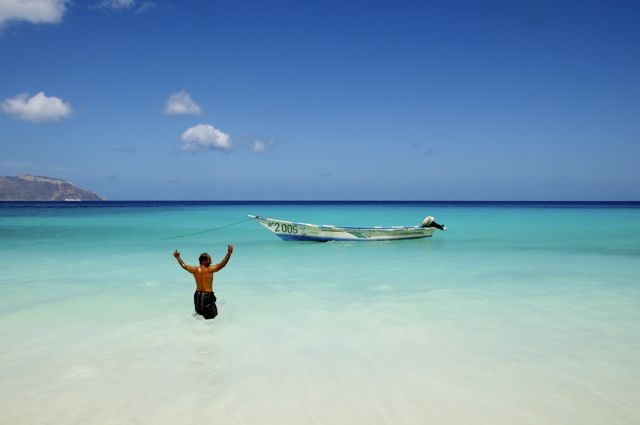
One of the wonderful beaches of the Socotra Archipelago, not yet ruined by mass tourism[82]
Qatar and Iran are the world’s largest extractors of natural gas and, together with Russia, account for more than half of the global market in the sector; the Gas Exporting Countries Forum – OPEC’s counterpart for natural gas – was founded in 2001 in Teheran and counts Qatar and Russia among its members[83]. Seeing the ties between Qatar and Iran strengthened, even in the Yemen conflict, is a further reason for the end of the embargo against Doha, which did not work, indeed making things worse. A first effect of the new agreement is the announcement by the legitimate Yemeni government in March 2021 that it has re-established relations with Doha[84].
By virtue of its ties with countries on all sides, the government of Tamim bin Hamad Al Thani could play a key role in mediating peace in Yemen[85], boasting, among other things, a long tradition of peacemaking: Qatar has, in fact, conducted diplomatic actions in the conflicts in Eritrea, Lebanon, Darfur, in Yemen itself and in Palestine, always with excellent results[86].
Mindful of what happened in Somalia in 2017, in reference to Mogadishu’s decision not to support the boycott against Qatar, leaving the field open to Turkish infiltration[87], the UAE government seems not to want to repeat the experience in the Yemeni conflict, with particular reference to Socotra.
Since the seizure of the island by the STC is a deterrent against Ankara’s expansionist aims, the Emirates strive to maintain the status quo in defiance of the Riyadh agreements: in February 2021, the governor of the island, Ramzi Mahrous, accused Abu Dhabi of continuing to support the southern separatists militarily[88]. The denunciation was triggered by the discovery of an Emirati ship moored in the island’s port: the port’s director general, Riyad Saeed Suleiman, warned Mahrous that 13 cars and six military buses were being taken off the boat. The vessel is reported to belong to the al-Khalifa humanitarian foundation[89].
Notwithstanding the military disengagement in the Yemenite conflict, the Emirates are also working to avoid that Iran, taking control of the Strait of Bab el Mandeb thanks to the Houthi rebels, achieves control of one of the most important corridors of the world maritime commerce (already territorially possessing the Strait of Hormuz, between the Persian Gulf and that of Oman)[90]; With the military bases at Berbera in Somaliland, Assab in Eritrea, Bosasso in Puntland and the control of Socotra through the support of the STC, Abu Dhabi acts as an obstacle to the aims of Teheran, but also to jihadism in East Africa[91].
The Abrahamic Agreements and converging interests in Socotra
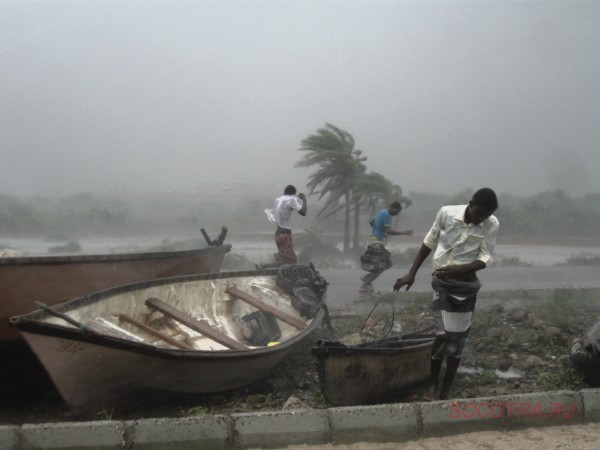
28 October 2015: Hurricane Chipala brings death and destruction to the Socotra archipelago[92]
Another reason for tension in the area is the process of normalisation of relations with Israel by the Gulf and Maghreb countries, which formally began with the Abraham Agreements: under US mediation, the UAE and Bahrain signed the Memorandum of Understanding in Washington on 15 September 2020, in the presence of Israeli Prime Minister Benjamin Netanyahu, UAE Foreign Minister Abdullah bin Zayed Al Nahyan and his Bahraini counterpart Abdullatif bin Rashid Al Zayani[93].
The Agreements clearly indicate the direction taken by the Gulf countries in terms of alliances and encourage other countries to imitate them: Sudan will sign in January 2021[94] and Morocco in December 2020[95]. The real objective, in the new phase in which this network is being stretched, seems to be the strengthening of relations with the United States, which would bring significant strategic advantages: historical allies of the United States, Israel, the Emirates and Morocco are working to build solid relations with both the Democrats and the Republicans[96].
After the signing of the Abrahamic Accords, the powerful lobby American Israel Public Affairs Committee (AIPAC)[97] is pushing to expand the group of adherents to the Accords by introducing the Israel Relations Normalisation Act in the US Senate through senators on both sides of the aisle[98]. The same AIPAC, which is usually opposed to the sale of arms to Arab countries, in December 2020 did not oppose the sale by the US government of 50 F-35 military jets, as well as drones and light weapons (a $23 billion deal[99]) to the Arab Emirates[100]. In the same month, the Israeli lobby successfully helped Sudan to get off the list of states accused of supporting terrorism after 27 years[101].
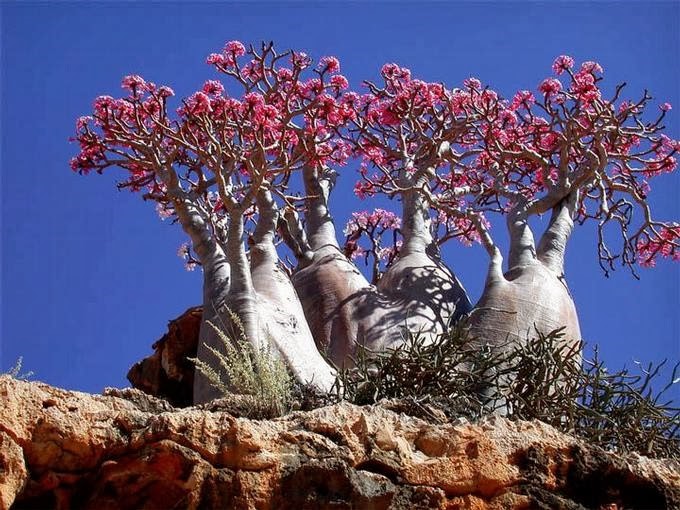
Trees on the island of Socotra – unique in the world[102]
Morocco also obtained an important victory, because the legitimacy of its aspirations for sovereignty over Western Sahara was recognised, and the Washington government sold Rabat a billion dollars worth of weapons, including drones and laser-guided munitions, useful for crushing the resistance of the Polisario Front[103]. In addition to this, there are important tourist and commercial contracts, and the “green light” for direct air links between Israel and the Emirates[104] and Morocco[105], which are useful both for tourism and for boosting investment[106].
Despite the fact that Morocco is a country with a tourist offer clearly superior to that of the Arab Emirates, Abu Dhabi is now betting everything on an island with unique characteristics: Socotra. In May 2021, Mukhtar Al-Rahbi, advisor to the Yemeni Ministry of Information, accused the Arab Emirates of having set up direct tourist links between Abu Dhabi and Hadiboh without the authorisation of the legitimate Yemeni governmen[107]t; hundreds of tourists (most of them Israelis) arrive every week on the island thanks to the Emirates’ travel arrangements, which also include visas[108].
Tel Aviv’s interest in Socotra is not only of a tourist nature: In August 2020, a project was launched to build an intelligence base on the island in cooperation with the Emirates, with the aim of monitoring the forces fighting against the Saudi-led coalition in Yemen, with particular reference to Iranian naval activity in the area[109]; the base would also have the task of analysing air and naval traffic in the southern Red Sea following the pro-government coalition’s takeover of a port in Eritrea to be used as a logistical base in the Yemeni conflict, and would also be responsible for monitoring Sudan[110]. The news triggered indignant reactions from the Yemeni government and AQAP, the Yemeni wing of al-Qaeda, which threatened to attack the island[111].
Saraya Wa’ad Allah, a Shia terrorist group based in Bahrain, which is supported by Iran, is also threatening retaliation against Israel following the Abrahamic Accords[112]; the group, which has ties to Hezbollah, may also have Socotra among its targets[113]. Tel Aviv was accused in February 2021 of stealing natural resources from Socotra, taking advantage of Emirati support; Zakaria Al-Shami, transport minister in the Houthi-led government in Sana’a, spoke about the matter[114]. But the desire to dominate the archipelago does not stop there.
Possible Russian mediation
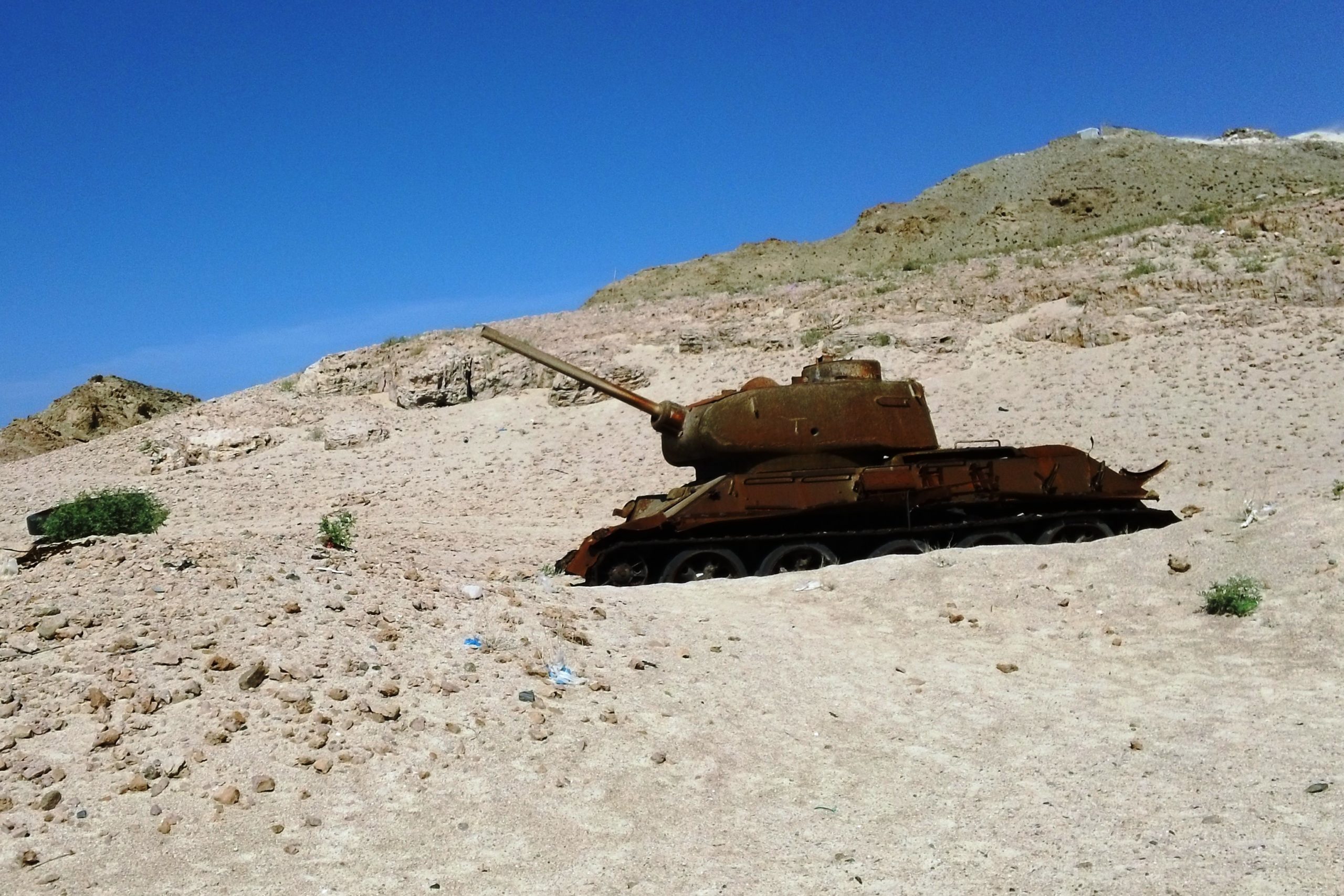
A Soviet-made panzer used by Yemen’s army on Socotra[115]
Russia’s interest in Yemen in general, and in Socotra in particular, dates back to the Cold War, when the possibility of installing a military base on the island was considered, given that, at the time, the Soviet fleet operated in the Gulf of Aden also to provide assistance to the island’s population and to South Yemen[116]. The excellent relations with the then Yemeni President Saleh led Moscow to announce the creation of a military base on Socotra in 2009, before the protests linked to the Arab Spring scuppered the project[117].
In the Yemeni conflict, Russia has been cautious from the start, only giving signs of a possible entry into the conflict in 2021 during a bilateral meeting between Russian Foreign Minister Sergey Lavrov and his Yemeni counterpart Ahmed Awad Bin Mubarak; the importance given to the issue of peace on that occasion could indicate Moscow’s potential willingness to play an active role in resolving the conflict[118].
Like Qatar, Russia could play an important mediation role thanks to its equidistance: if it is Iran’s ally in the Syrian war[119], there are no signs of its involvement alongside Tehran in Yemen. In 2016, Moscow proposed itself as a mediator between the Saudi-led coalition and former President Saleh, then a Houthi ally[120], until Saleh was killed by the Houthis in December 2017[121].
In 2020, the UAE facilitates a meeting between representatives of the STC and Putin’s special envoy for the Middle East and Africa, Mikhail Bogdanov[122]. In March 2021, Minister Lavrov makes a tour of meetings in the Middle East (UAE, Saudi Arabia and Qatar) to discuss new prospects for development, but also to propose Russia as a mediator in conflicts in the area[123].
In light of the network of ties built up and maintained, Putin could play a fundamental role in the resolution of the conflict, especially in view of his own main interest: representatives of the Yemeni government have in fact made it clear that the presence of Emirati troops in Socotra would be temporary and that, if Moscow makes the appropriate decisions regarding the role to be played, the island could see the arrival of Russian soldiers to replace those from Abu Dhabi[124].
Socotra, a destiny already written?
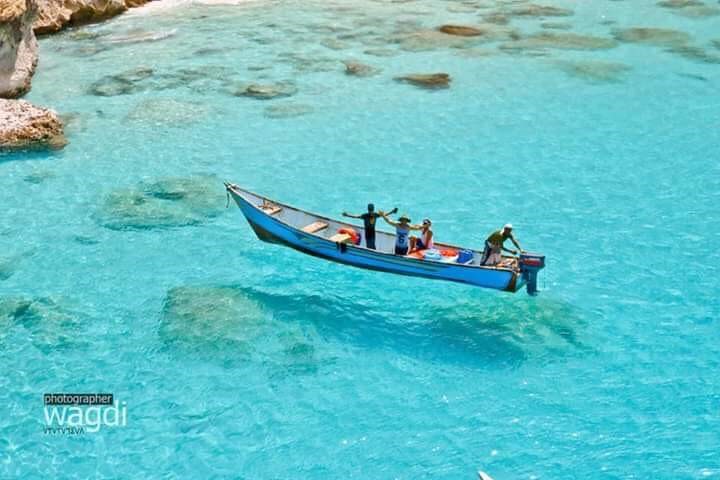
Fishermen, still the epicentre of Socotra’s economy[125]
Reading these lines, it is clear to anyone that even the Socotra archipelago is destined to be swallowed up by globalisation: war, foreign occupation, exogenous population growth, tourism, mining, and the beauty and uniqueness of nature and thousands of years of cultural traditions disappear. Certainly, its future is not in safe hands: the position it occupies, so far away from the country to which it belongs, preserves it from the devastating consequences of the conflict afflicting the motherland, but assigns it the inauspicious destiny of finding itself at the mercy of waves whose impact will be difficult to withstand.
[1] George Wynn Brereton Huntingford, “The Periplus of the Erythraean Sea”, Hakluyt Society, London 1980, p. 103; https://www.darkroastedblend.com/2008/09/most-alien-looking-place-on-earth.html
[2] https://www.islandstudies.ca/sites/islandstudies.ca/files/jurisdiction/Socotra.html
[3] https://www.readytraveler.com/socotra-island-the-unique-island-of-yemen/socotra-island-photos/ ; https://www.uaetrekkers.com/socotra-yemen
[4] https://web.archive.org/web/20111009101750/http://www.ihae.ru/konfer/simpozium.htm
[5] Asher Orkaby, “Yemen – What Everyone Needs to Know”, Oxford University Press, 2021, p.49
[6] Asher Orkaby, “Yemen – What Everyone Needs to Know”, Oxford University Press, 2021, p.49
[7] http://whc.unesco.org/en/list/1263/
[8] http://whc.unesco.org/en/list/1263/
[9] “Support to the Integrated Program for the Conservation and Sustainable Development of the Socotra Archipelago”, United Nations Environment Programme, 2014, p. 10
[10] https://carnegie-mec.org/diwan/80827
[11] https://www.ispionline.it/it/pubblicazione/la-guerra-yemen-e-linsostenibile-neutralita-di-socotra-25242
[12] https://www.dailysabah.com/world/mid-east/car-bomb-attack-targeting-aden-governor-kills-5-in-yemen
[13] Mary Kaldor, “New and Old Wars”, Stanford University Press, 2012, p. 6 ; Asher Orkaby, “Yemen – What Everyone Needs to Know”, Oxford University Press, 2021, p.5
[14] https://uca.edu/politicalscience/dadm-project/middle-eastnorth-africapersian-gulf-region/yemen-1990-present/
[15] Asher Orkaby, “Yemen – What Everyone Needs to Know”, Oxford University Press, 2021, pp. 4-5
[16] Asher Orkaby, “Yemen – What Everyone Needs to Know”, Oxford University Press, 2021, pp. 4-5
[17] https://www.huffingtonpost.it/2017/12/04/ucciso-lex-presidente-yemenita-saleh-ribelli-houthi-mettono-in-rete-video-con-il-cadavere_a_23296214/
[18] Jeremy M. Sharp, “Yemen: Civil War and Regional Intervention”, Congressional Research Service, April 2020, p. 4
[19] Jeremy M. Sharp, “Yemen: Civil War and Regional Intervention”, Congressional Research Service, September 2019
[20] https://www.aa.com.tr/en/middle-east/yemeni-govt-designates-ataq-city-new-interim-capital/1595049
[21] Jeremy M. Sharp, “Yemen: Civil War and Regional Intervention”, Congressional Research Service, April 2020, p. 4
[22] Jeremy M. Sharp, “Yemen: Civil War and Regional Intervention”, Congressional Research Service, April 2020, p. 4
[23] Jeremy M. Sharp, “Yemen: Civil War and Regional Intervention”, Congressional Research Service, April 2020, p. 4
[24] Jeremy M. Sharp, “Yemen: Civil War and Regional Intervention”, Congressional Research Service, April 2020, p. 4
[25] Jeremy M. Sharp, “Yemen: Civil War and Regional Intervention”, Congressional Research Service, April 2020, p. 4
[26] Shabia Mantoo, UNHCR spokesperson at briefing at Palais des Nations, Geneva, 28 April 2020, in “Yemen, Volume Three: September 2018-May 2020”, edited by Ardeshir Zahedi, 2020, pp.508-510
[27] Jeremy M. Sharp, “Yemen: Civil War and Regional Intervention”, Congressional Research Service, March 2021, p. 10
[28] https://www.hrw.org/world-report/2021/country-chapters/yemen
[29] https://questionsorientoccident.blog/2019/06/16/socotra-golfe-daden-corne-de-lafrique-mer-rouge-le-collier-de-perles-de-limperialisme-regional-des-emirats-arabes-unis-depuis-2015/
[30] https://reliefweb.int/sites/reliefweb.int/files/resources/Yemen_Flash_%20Update_%2011_19_Nov_Final.pdf
[31] https://reliefweb.int/report/yemen/khalifa-foundation-sends-aid-socotra-archipelago
[32] https://www.thenationalnews.com/uae/government/2021/07/31/uae-has-pledged-110-million-in-humanitarian-aid-to-socotra-since-2015/
[33] https://www.thenationalnews.com/opinion/uae-offers-a-helping-hand-to-the-island-of-socotra-1.6185
[34] https://www.thenationalnews.com/uae/government/2021/07/31/uae-has-pledged-110-million-in-humanitarian-aid-to-socotra-since-2015/
[35] Ismail Numan Telci and Tuba Öztürk Horoz, “Military Bases in the Foreign Policy of the United Arab Emirates”, in Insight Turkey vol. 20 / No. 2, 2018, p. 149
[36] Ismail Numan Telci and Tuba Öztürk Horoz, “Military Bases in the Foreign Policy of the United Arab Emirates”, in Insight Turkey vol. 20 / No. 2, 2018, p. 149
[37] Ismail Numan Telci and Tuba Öztürk Horoz, “Military Bases in the Foreign Policy of the United Arab Emirates”, in Insight Turkey vol. 20 / No. 2, 2018, p. 150
[38] https://ibiworld.eu/2021/10/12/al-shabaab-la-spada-di-damocle-sulla-somalia/
[39] https://www.jpost.com/Middle-East/Socotra-How-a-strategic-island-became-part-of-a-Gulf-power-struggle-553599
[40] Ismail Numan Telci and Tuba Öztürk Horoz, “Military Bases in the Foreign Policy of the United Arab Emirates”, in Insight Turkey vol. 20 / No. 2, 2018, p. 149; https://www.independent.co.uk/news/world/middle-east/socotra-island-yemen-civil-war-uae-military-base-unesco-protected-indian-ocean-a8331946.html
[41] https://www.jpost.com/Middle-East/Socotra-How-a-strategic-island-became-part-of-a-Gulf-power-struggle-553599
[42] https://www.aljazeera.com/news/2018/5/3/anger-erupts-on-yemens-socotra-as-uae-deploys-over-100-troops
[43] Ismail Numan Telci and Tuba Öztürk Horoz, “Military Bases in the Foreign Policy of the United Arab Emirates”, in Insight Turkey vol. 20 / No. 2, 2018, pp. 150-151
[44] https://www.avvenire.it/opinioni/pagine/il-paradiso-dello-yemen-conteso-da-emirati-e-arabia
[45] https://www.thenationalnews.com/world/mena/uae-s-gargash-says-socotra-presence-not-strategic-1.732148
[46] https://ibiworld.eu/2020/08/21/se-abu-dhabi-pensa-di-pilotare-donald-trump/
[47] https://www.avvenire.it/opinioni/pagine/il-paradiso-dello-yemen-conteso-da-emirati-e-arabia
[48] https://www.middleeasteye.net/news/uae-military-withdraws-yemens-socotra-under-saudi-deal
[49] https://ibiworld.eu/the-new-cold-war/
[50] https://www.avvenire.it/opinioni/pagine/il-paradiso-dello-yemen-conteso-da-emirati-e-arabia
[51] https://www.middleeastmonitor.com/20201214-uae-continues-to-build-bases-on-yemens-socotra-island/
[52] https://www.al-monitor.com/originals/2019/09/yemen-socotra-island-south-uae-saudi-influence.html
[53] https://www.reuters.com/article/us-yemen-security/uae-carries-out-air-strikes-against-yemen-government-forces-to-support-separatists-idUSKCN1VJ17F
[54] https://www.al-monitor.com/originals/2019/09/yemen-socotra-island-south-uae-saudi-influence.html
[55] https://sanaacenter.org/publications/analysis/7606
[56] https://www.aa.com.tr/en/middle-east/saudi-arabia-oman-compete-for-control-in-yemen-s-mahra/2098447
[57] https://sanaacenter.org/publications/analysis/7606
[58] https://sanaacenter.org/publications/analysis/7606
[59] https://sanaacenter.org/publications/analysis/7606
[60] https://www.reuters.com/article/us-yemen-security-hadi-idUSKBN1XH2JE
[61] https://stc-eu.org/document-of-the-riyadh-agreement-between-the-legitimate-government-and-the-southern-transitional-council/
[62] https://www.ispionline.it/it/pubblicazione/yemens-southern-transitional-council-delicate-balancing-act-29793
[63] https://www.ispionline.it/it/pubblicazione/yemens-southern-transitional-council-delicate-balancing-act-29793
[64] https://orientxxi.info/magazine/yemen-the-socotra-archipelago-threatened-by-the-civil-war,4988
[65] https://www.aljazeera.net/news/2020/6/19/%D8%AA%D8%B7%D9%88%D8%B1%D8%A7%D8%AA-%D9%84%D8%A7%D9%81%D8%AA%D8%A9-%D8%A8%D8%B3%D9%82%D8%B7%D8%B1%D9%89-%D8%A7%D9%84%D9%8A%D9%85%D9%86%D9%8A%D8%A9-%D9%82%D9%88%D8%A7%D8%AA
[66] https://sicurezzainternazionale.luiss.it/2020/06/22/yemen-la-caduta-socotra-ruolo-dellasse-doha-ankara/
[67] https://orientxxi.info/magazine/yemen-the-socotra-archipelago-threatened-by-the-civil-war,4988
[68] https://orientxxi.info/magazine/yemen-the-socotra-archipelago-threatened-by-the-civil-war,4988
[69] https://www.youtube.com/watch?v=_pf3arNy8Sw
[70] https://ibiworld.eu/2021/10/12/al-shabaab-la-spada-di-damocle-sulla-somalia/
[71] https://thearabweekly.com/yemens-stc-thwarts-muslim-brotherhoods-plans-socotra
[72] https://thearabweekly.com/muslim-brotherhoods-socotra-setback-deals-blow-turkish-influence-yemen
[73] https://thearabweekly.com/muslim-brotherhoods-socotra-setback-deals-blow-turkish-influence-yemen
[74] https://nordicmonitor.com/2019/02/hamid-abdullah-al-ahmar-erdogans-errand-boy-in-the-arab-world/
[75] https://www.agi.it/estero/news/2021-01-05/golfo-qatar-emiro-arabia-saudita-embargo-fine-10909100/ ; https://ibiworld.eu/2021/02/15/golfo-persico-la-guerra-dopo-larmistizio/
[76] https://www.agi.it/estero/news/2021-01-05/golfo-qatar-emiro-arabia-saudita-embargo-fine-10909100/ ; https://ibiworld.eu/2021/02/15/golfo-persico-la-guerra-dopo-larmistizio/
[77] https://www.treccani.it/magazine/atlante/geopolitica/Ragioni_fine_embargo_contro_Qatar.html
[78] https://theglobepost.com/2019/09/13/turkey-support-qatar/
[79] https://www.treccani.it/magazine/atlante/geopolitica/Ragioni_fine_embargo_contro_Qatar.html
[80] https://theglobepost.com/2019/09/13/turkey-support-qatar/
[81] Nader Habibi, “Impact of the Qatar Crisis on Turkey’s Economic Relations with GCC Countries”, Crown Center for Middle East Studies, Brandeis University, August 2019
[82] https://www.pinterest.de/pin/258042253622719841/
[83] https://www.gecf.org/about/history.aspx
[84] https://sicurezzainternazionale.luiss.it/2021/03/07/lo-yemen-riallaccia-rapporti-qatar-riad-bombarda-gli-houthi/
[85] https://research.sharqforum.org/2021/07/02/will-qatar-return-to-a-mediator-role-in-the-yemen-conflict/
[86] Sultan Barakat, “Qatari Mediation: Between Ambition and Achievement”, Brookings Doha Center Analysis Paper, Number 12, November 2014
[87] https://www.mei.edu/publications/protracted-conflict-yemens-island-socotra-reflects-rival-geopolitical-ambitions
[88] https://sicurezzainternazionale.luiss.it/2021/02/28/yemen-abu-dhabi-continua-ad-armare-combattenti-socotra/
[89] https://www.alaraby.co.uk/politics/%D8%A7%D8%AA%D9%87%D8%A7%D9%85%D8%A7%D8%AA-%D9%84%D9%84%D8%A5%D9%85%D8%A7%D8%B1%D8%A7%D8%AA-%D8%A8%D8%A5%D8%AF%D8%AE%D8%A7%D9%84-%D8%A3%D8%B3%D9%84%D8%AD%D8%A9-%D8%A5%D9%84%D9%89-%D8%B3%D9%82%D8%B7%D8%B1%D9%89-%D8%A7%D9%84%D9%8A%D9%85%D9%86%D9%8A%D8%A9-%D8%AA%D8%AD%D8%AA-%D8%BA%D8%B7%D8%A7%D8%A1-%D8%A5%D9%86%D8%B3%D8%A7%D9%86%D9%8A
[90] https://www.repubblica.it/esteri/2021/06/20/news/le_mani_su_socotra_l_isola_strategica_per_il_controllo_di_suez-306914088/?ref=search
[91] https://www.repubblica.it/esteri/2021/06/20/news/le_mani_su_socotra_l_isola_strategica_per_il_controllo_di_suez-306914088/?ref=search
[92] https://socotra.info/cyclone-chapala-storms-socotra.html
[93] https://www.ilriformista.it/che-cosa-sono-gli-accordi-di-abramo-lintesa-tra-israele-emirati-arabi-uniti-e-bahrein-218795/
[94] https://www.reuters.com/article/uk-sudan-usa-israel-idUSKBN29C0Q5
[95] https://www.reuters.com/article/israel-usa-morocco-int-idUSKBN28K2CW
[96] https://www.opensecrets.org/fara/results?location=Morocco ; https://www.opensecrets.org/fara/results?query=&location=United+Arab+Emirates®istrant=&foreign-principal=&start-date=&end-date= ; https://www.opensecrets.org/fara/results?query=&location=Israel®istrant=&foreign-principal=&start-date=&end-date=
[97] https://www.opensecrets.org/federal-lobbying/clients/summary?cycle=2018&id=D000046963 ; https://www.aipac.org/
[98] https://www.thenationalnews.com/world/pro-israel-lobby-aipac-pushes-to-expand-abraham-accords-1.1193495
[99] reuters.com/business/aerospace-defense/exclusive-biden-administration-proceeding-with-23-billion-weapon-sales-uae-2021-04-13/
[100] https://www.jpost.com/israel-news/aipac-when-israel-lobbies-for-the-arabs-652346
[101] https://www.dw.com/en/us-removes-sudan-from-terror-sponsors-list/a-55929149
[102] http://diegobraghi.blogspot.com/2014/02/the-unique-trees-and-plants-of-socotra.html
[103] https://www.jpost.com/israel-news/aipac-when-israel-lobbies-for-the-arabs-652346
[104] https://www.flightglobal.com/dubai-2021/post-abraham-accords-how-israel-and-the-uae-have-rapidly-made-connections/145942.article
[105] https://formiche.net/2021/07/in-marocco-si-consolidano-gli-accordi-di-abramo/
[106] https://www.flightglobal.com/dubai-2021/post-abraham-accords-how-israel-and-the-uae-have-rapidly-made-connections/145942.article
[107] https://www.middleeastmonitor.com/20210510-uae-operating-illegal-tourist-trips-to-yemens-socotra/
[108] https://www.middleeastmonitor.com/20210519-israel-tourists-flock-to-socotra-part-of-illegal-uae-run-holidays/
[111] https://www.jforum.fr/menaces-sur-socotra-depuis-les-pactes-avec-les-eau-et-bahrein.html
[112] https://www.longwarjournal.org/archives/2020/09/analysis-iranian-backed-group-in-bahrain-creates-sub-unit-to-target-israeli-interests.php
[113] https://www.jforum.fr/menaces-sur-socotra-depuis-les-pactes-avec-les-eau-et-bahrein.html
[114] https://www.middleeastmonitor.com/20210201-israel-accused-of-stealing-resources-on-yemens-socotra-says-minister/
[115] https://commons.wikimedia.org/wiki/File:Russian_Tank_-_Socotra_island,_Indian_Ocean_-_Republic_of_Yemen.jpg
[116] https://socotra.info/soviet-military-base-on-socotra-the-myth-and-reality.html
[117] https://www.al-monitor.com/originals/2021/06/russia-looks-way-back-yemen
[118] https://www.al-monitor.com/originals/2021/06/russia-looks-way-back-yemen
[119] https://www.atlanticcouncil.org/wp-content/uploads/2019/06/Russia_and_Iran_in_Syria_a_Random_Partnership_or_an_Enduring_Alliance.pdf
[120] https://www.aspistrategist.org.au/russia-is-astutely-playing-the-players-in-yemen/
[121] https://www.theguardian.com/world/2017/dec/04/former-yemen-president-saleh-killed-in-fresh-fighting
[122] https://www.aa.com.tr/en/middle-east/stc-discusses-yemen-developments-with-russian-minister/1822728 ; https://www.aspistrategist.org.au/russia-is-astutely-playing-the-players-in-yemen/
[123] https://tass.com/politics/1263713
[124] https://www.al-monitor.com/originals/2021/06/russia-looks-way-back-yemen
[125] https://socotratours.com/about-socotra-everything-you-need-to-know-about-socotra-island/
Leave a Reply